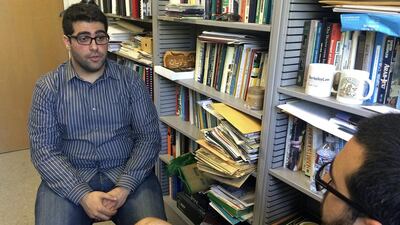In another time and place, this could almost be described as amusing. The word “inshallah” is often known to demanding Arab children as the parental code word for “it’s probably not going to happen”. On a Southwest Airlines flight in the United States a few days ago, however, it was interpreted quite differently – resulting in law enforcement officials being called in and the abuse of an innocent passenger. It’s not the first such incident, however. And it is unlikely to be the last.
The phrase is well-known in the Arab world and among Muslim communities globally and cuts across religious and ethnic lines. Christians and Jews, among many others, commonly use the expression.
It’s a recognition of God’s will being at work in the world – and in other languages, similar expressions exist. The passenger in question, Khairuldeen Makhzoomi, had the misfortune of being mistaken for uttering “shaheed”, which means martyr. That sort of cultural misunderstanding is unfortunate – but it should have been fairly easy to explain, if that were really necessary. Instead, Mr Makhzoomi was escorted from the plane and questioned by the FBI.
On another occasion, Hakima Abdulle, a Muslim woman who wears the hijab, was also removed from a Southwest flight this month, after a passenger said she was “uncomfortable” with Ms Abdulle’s presence. It’s bad enough that the passenger felt uncomfortable – it’s far worse that the airline staff felt empowered to have Ms Abdulle removed.
These are not isolated events and this issue is directly connected to the deepening of a worsening trend in political discourse in the US and elsewhere. The notion of visible expressions of Muslim identity is increasingly problematic for significant proportions of the United States. The Republican presidential nominee race has latched onto that, and different candidates have been involved in rather ugly competitions about who can be more accusatory of the Muslim community at large.
It does not only affect Muslims in the US, however – but in Europe as well. On a recent trip between the Arab world and Europe, I witnessed a Muslim woman replacing the headscarf with a smart cap and turtleneck top. I can only assume she did not feel secure arriving in Europe with a hijab – and that ought to be of great concern to all Europeans, Muslim and non-Muslim alike.
But this is the state we are in. On various occasions, those who raise the issue of bigotry or discrimination are told that as long as it does not technically break the law, we ought to try to simply understand why the bigotry exists.
Indeed, there will be many understandable reasons for that. The mass changes that have taken place in Europe over only a few decades due to immigration are genuinely big changes, and it is not surprising that significant numbers will react negatively. Big change can often be uncomfortable.
Yet there is a difference between understanding why bigotry and prejudice exists and being complacent about it. Islam is not alien to the United States – but has been present, according to many historians, since before the founding of the country. In Europe, Muslims have existed, as Europeans, since the seventh century. There is a history of Islam and Muslims in the West, and of the West, that is simply there – we cannot pretend otherwise.
Even if that history was not there, the reality is that Muslims in the West are now of the West. Some politicians appear uncomfortable with the visibility of that – hence, for example, Laurence Rossignol, France’s minister for women’s rights, took issue with Muslim women who covered themselves. The almost obsession with how Muslim women choose or do not choose to observe their faith, is fascinating – and disturbing.
Europe prides itself on advances in fundamental freedoms – and the United States upholds much the same – but religious freedoms are also freedoms.
For believers, religion’s purpose is not to serve as an identity marker – but commitment to their faith is often outwardly visible, and unless there is an overriding public interest of harm involved, they ought not to be penalised for that. Otherwise, our commitments to rights and freedoms become very shallow indeed.
In the meantime, it may be time for non-Arabs in the West to learn a few words of Arabic – to specifically say out loud on planes, as we might say words in any other language. At the very least, that kind of direct action is warranted – for societies are rightly judged by how they respect, or disrespect, the vulnerable among themselves.
Dr HA Hellyer is an associate fellow at the Royal United Services Institute in London and a non-resident senior fellow at the Rafik Hariri Center for the Middle East at the Atlantic Council in Washington, DC
On Twitter: @hahellyer


